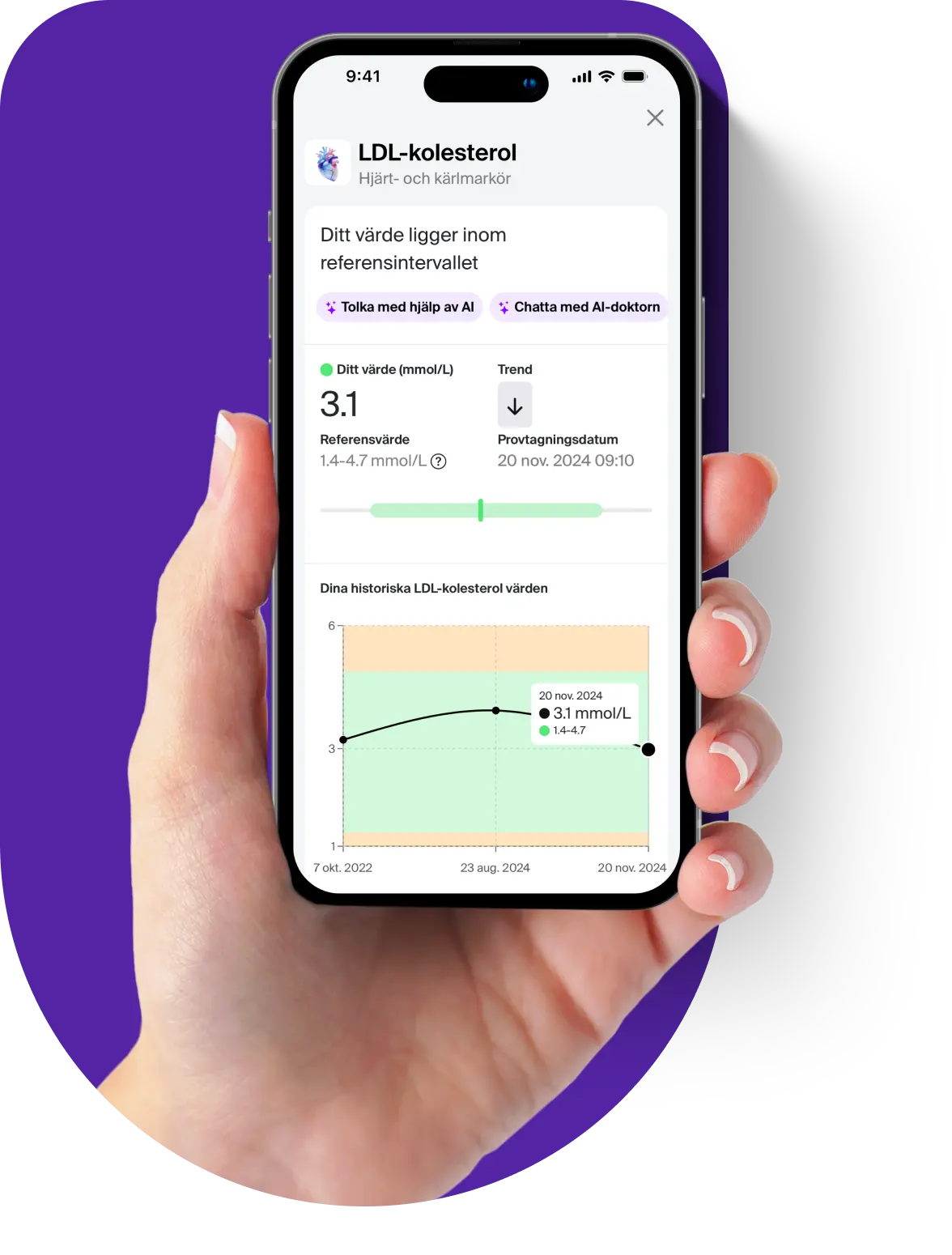What is PSA?
PSA, or prostate-specific antigen, is an enzyme produced in the prostate gland and is naturally present in the blood of all men. Under normal conditions, PSA levels are low, but they can increase with age as the prostate grows. Elevated PSA values can have several causes, such as benign prostatic hyperplasia, inflammation of the prostate gland (prostatitis) or, in some cases, prostate cancer.
A PSA test is primarily used as an indicator of prostate cancer, but it can also provide valuable information about other prostate problems. Since PSA levels can be affected by several factors, it is important to understand the limitations and possibilities of the test. Regular testing can increase the chances of detecting cancer at an early stage, but it should always be done with an understanding of both the advantages and disadvantages.
Book a PSA test - get a referral immediately
A PSA test is performed to detect prostate cancer. PSA is an abbreviation for prostate-specific antigen, which is a protein substance, an enzyme, that is naturally found in the body even in healthy men. A PSA test is taken through a blood test.
Important! PSA tests should only be booked if they are performed annually, as only regular testing can lead to a reduced risk of developing advanced prostate cancer. Before booking a PSA test, we recommend that you read the Vårdguiden brochure.
Prostate cancer is one of our most common diseases in Sweden (and in the world) but is a rare disease before the age of 50, except for relatives of men who have been affected unusually early. Men over the age of 75 who have no symptoms suggestive of prostate cancer may well have a small prostate cancer, but it is unlikely to develop into a serious disease during their lifetime.
Men between the ages of 50 and 75 may consider PSA testing even if they have no symptoms suggestive of prostate cancer.
Pros and cons of doing a PSA test
There are both pros and cons of measuring PSA, where the advantages are, for example, that the worry of getting cancer can be reduced or that a serious prostate cancer is detected before it has spread at an early stage, which increases the chance of being cured.
The disadvantages can be, for example, that you receive a message about an elevated PSA value even though you do not have prostate cancer, which can lead to other tests and examinations, or that you receive a cancer diagnosis even if the cancer is so small that you would never get sick from it, which in itself can reduce the quality of life with the knowledge that you have cancer.
It is therefore important that you consider whether the benefits outweigh the disadvantages before ordering a PSA test, we therefore recommend that you read the Vårdguiden brochure that addresses these and that you can then make an informed choice about testing your PSA levels.Interpretation of the PSA value
An elevated PSA value above 3.0 µg/L may indicate prostate cancer, but usually benign prostatic hyperplasia or prostatitis (inflammation of the prostate gland) or a temporary elevation. To confirm a cancer diagnosis, further tests such as transrectal ultrasound (TRUS) and/or prostate biopsy are required.
Factors that can give misleadingly elevated PSA levels include not only physical pressure on the prostate, such as from cycling, or recent ejaculation, but also urinary tract infections and certain medications. Urinary tract infections can temporarily increase PSA levels because they can irritate or inflame prostate tissue. On the other hand, some medications, such as 5-alpha reductase inhibitors (used to treat benign prostatic hyperplasia and hair loss), can lower PSA levels, which can cause a PSA test to underestimate the risk of prostate cancer. Avoid cycling and ejaculation for 24 hours before the test to avoid falsely high values.
What is a normal PSA value?
Age and other factors play a role in interpreting what is normal PSA levels, and there is no exact boundary between normal and elevated values. To facilitate interpretation, reference ranges are used that take age into account, as PSA levels can naturally increase with age.
Below is a table with the upper reference limits for PSA in men:
| Age | Upper reference limit for P-PSA (µg/L) |
|---|---|
| < 70 years | < 3.0 |
| 70–80 years | < 5.0 |
| > 80 years | < 7.0 |
PSA values can be affected by factors such as prostatitis, urinary tract infections and physical activity as these affect the prostate. In the case of elevated values, a comprehensive medical assessment is recommended to determine any further investigation needs.









































